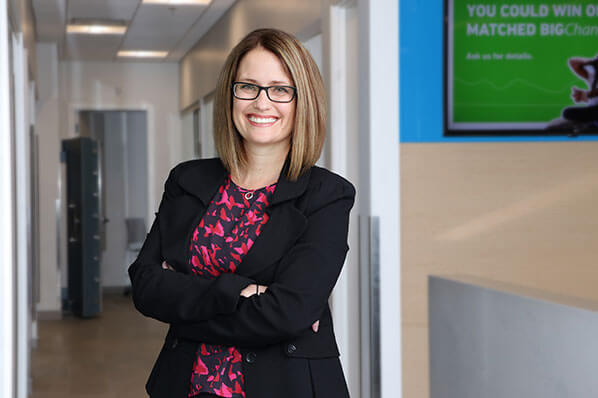REFERRAL PERKS®
Earn $100* for you and your friend for every successful referral.
Learn how an FHSA helps you save for your first home faster.
Learn which savings option is the best for your financial goals.
Explore this step-by-step complete guide to starting a business in British Columbia.
We’ve rounded up 10 of the most common scams — along with ways to identify and outsmart them.

Lara Kinvig is the assistant branch manager of our Oliver branch. We touched base with her to find out how she personally saves.
My advice would be to always pay yourself first! You should always strive to save 10-15% of your paycheque when you can. Valley First, like many employers, offers a payroll deduction for an RRSP contribution, as well as a matching contribution. Currently 15% of my monthly payroll goes to my RRSP. If this was not offered by my employer, I would meet with my advisor and set up an automatic payment from my payroll account into my investment (Either an RRSP or TFSA depending on my goals for that money).
Further reading: RRSPs vs. TFSAs | Complete Guide to TFSAs
My life changed 18 months ago when I had my first child. This has created different goals and budgeting strategies.
Prior to having my son, my goal was to retire at 55. That has changed a little, as I have had him later in life than I expected. My original strategy was to own a couple of properties and use one property to gain rental income and therefore pay down that mortgage. Eventually, the mortgage would be paid off, I would have an asset that at retirement I could either sell and use the money earned to supplement my pension income, or move out of my home and downsize.
Since having my son, I am now spending more monthly on daycare which changes my ability to save in the same way. I still continue with my RRSPs and am currently in the process of starting an RESP for my son. This can be tough for many people because having extra cash at the end of the month is hard. For me, I plan to use some of the money I get from my child care benefit (from the government). It may start small…but it’s a start and it will grow, because I’ll continue with an automatic deduction from my account.
Further reading: Guide to RESP Grants: How To Save For Your Children's Education
Investments for me and my husband are automatic — I don’t have to think about it.
I do have some bills that are automatic but I pay most of them manually. I do this to have some control over when the payments are made. Honestly, this comes down to preference; know that you have options and choose what works best for you and your family.
For example, I have set up our credit cards with an automatic minimum payment that is deducted from my account to ensure I don’t miss a payment date. I don’t do full payment, only because I wait till the night before payday and if I have extra cash in my account, I apply it at that time.
When I'm saving up, I look at my take-home pay, deduct my expenses, figure out what I can give up or spend less on and set those funds aside in a different account.
My family lives scattered across several countries, with my parents now living in Australia. I’m really excited because we are headed there in just a few months for the holidays. It will be the first time my son meets some of my family and I can’t wait!
I had some money set aside for our trip, and put the rest on my Valley First Mastercard credit card for the points. I then make a payment to my credit card from my line of credit (it has a lower interest rate) and worked out how much I can pay monthly to get it paid off! I love my credit card but also have a healthy respect for it.
This is going back a few years but I had a savings account, with a savings book. I worked as a server for my first job and luckily lived at home, so other than spending money, I was able to save very well. In fact, I bought my own ticket to travel overseas at 18 years old and have been financially independent since then!
I think the big thing for me was just getting into a habit of saving. Even now, before I buy something, I stop and think, “Do I really need this?”
My dad always told me to save 10% of my wages. When I was 18 and into my early 20s I was like, “Sure dad” and just did it to please him, but then I could see my savings growing, and ultimately was able to travel the world and have experiences I would never have had if I hadn’t saved.
You don't have to build your financial plan alone. Our financial advisors have the experience and the expertise to help you create a plan so you can reach your financial goals. Book a financial snapshot and start your tomorrow today.
Everything is easier with a little help.
We acknowledge that we have the privilege of doing business on the traditional territory of First Nations communities.
© First West Credit Union. All rights reserved.
Proudly Canadian